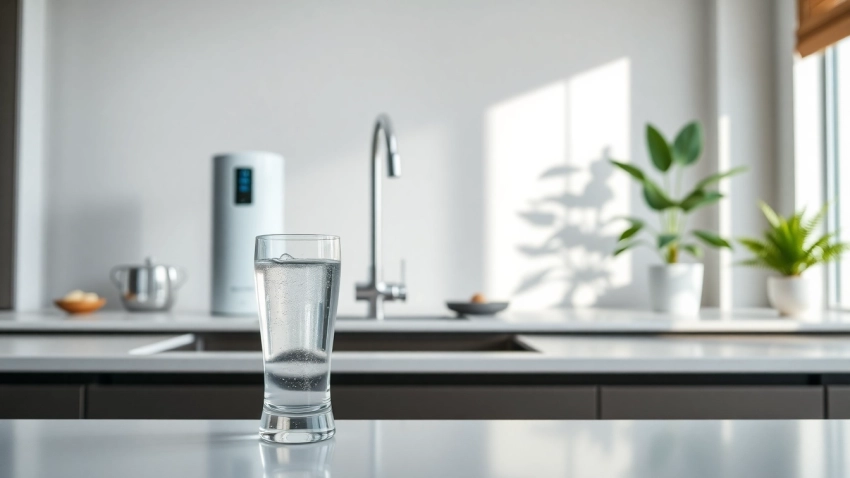
Maximizing Efficiency with Commercial Water Filtration System Solutions
Understanding Commercial Water Filtration Systems
What is a Commercial Water Filtration System?
A commercial water filtration system is a comprehensive setup designed to remove impurities from water used in various commercial settings, including offices, restaurants, manufacturing facilities, and more. These systems often utilize multiple filtration methods to ensure that the water meets health and safety standards, providing clean, safe drinking water for employees and customers. Investing in a commercial water filtration system can significantly enhance water quality, which in turn can improve operational efficiency and health standards in any business.
Key Benefits of Commercial Water Filtration Systems
Implementing a commercial water filtration system offers numerous benefits that can influence a business’s overall performance:
- Improved Water Quality: Filtration systems effectively remove contaminants such as chlorine, sediment, and heavy metals, resulting in cleaner, better-tasting water.
- Health Safety: By providing clean drinking water, these systems reduce the risk of waterborne diseases, ensuring the health of employees and customers alike.
- Cost Savings: Businesses can save on costs associated with bottled water purchases and maintenance of appliances used for boiling or filtering water.
- Environmental Impact: Reducing reliance on bottled water and utilizing filtration systems can significantly decrease plastic waste, contributing to eco-friendliness.
- Enhanced Equipment Lifespan: By removing mineral buildup and sediments, companies can protect their investments in appliances that depend on water, like coffee machines and dishwashers.
Components of a Commercial Water Filtration System
A typical commercial water filtration system comprises several components, each serving a specific purpose in the filtration process:
- Pre-filtration Unit: This unit captures larger particles such as sediments, gravel, and rust.
- Activated Carbon Filter: This component removes chemicals and contaminants like chlorine and volatile organic compounds (VOCs) through adsorbent properties.
- Reverse Osmosis Membrane: It eliminates up to 99% of dissolved solids, providing purified water for various uses.
- Post-Filtration Unit: This unit provides any final filtration necessary before the water is dispensed.
- UV Light Purification: This optional component utilizes ultraviolet light to kill bacteria and viruses, adding an extra layer of protection against pathogens.
Types of Commercial Water Filtration Systems
Reverse Osmosis Systems
Reverse osmosis (RO) systems are highly effective, relying on a semi-permeable membrane to filter out impurities from water. Water is forced through the membrane, which allows only water molecules to pass while rejecting contaminants. This method is particularly beneficial in industries requiring high-purity water, such as food and beverage manufacturing, pharmaceuticals, and laboratories.
Activated Carbon Filters
Activated carbon filters are a common and cost-effective choice for removing chlorine, taste, odorous compounds, and other substances. These filters work through a process called adsorption, where contaminants adhere to the carbon’s surface. This filtration type is often used in restaurants and cafes, ensuring the delivery of clean, tasty water for beverages and food preparation.
UV Water Purification Systems
Ultraviolet (UV) water purification systems use UV light to disinfect water. When water passes through a chamber exposed to UV light, bacteria, viruses, and other pathogens are inactivated, ensuring safe drinking water. These systems are particularly useful for applications where biological contaminants are a concern, making them popular in healthcare and food service industries.
Choosing the Right Commercial Water Filtration System
Assessing Your Water Quality Needs
The first step in selecting a commercial water filtration system is assessing your specific water quality needs. Conducting a comprehensive water quality test can help identify contaminants present in your water supply, such as metals, bacteria, or specific chemicals. This analysis will guide you in choosing the right filtration technology suited for your needs.
Comparing Cost and Performance
When investing in a commercial water filtration system, cost and performance are critical factors. Consider initial purchase costs, installation, ongoing maintenance, and operational energies associated with each system type. Some systems might have a higher upfront cost but offer significant savings over time in terms of maintenance and improved efficiency. To make an informed decision, comparing various models and brands on performance metrics is essential.
Installation Considerations for Commercial Use
Installation of a commercial water filtration system should be planned carefully. It involves understanding the available space, water supply connections, and power requirements. Consider collaboration with a certified professional for accurate installation to avoid potential issues down the line. An effective installation ensures optimal system performance and adherence to health regulations.
Maintaining Your Commercial Water Filtration System
Regular Maintenance Practices
Regular maintenance of your commercial water filtration system is crucial to ensure it operates effectively and prolongs its lifespan. Common maintenance tasks include:
- Replacing filters as recommended by the manufacturer.
- Conducting periodic system checks to identify any leaks or malfunctions.
- Cleaning components like storage tanks and UV lamps to ensure they function properly.
- Monitoring system pressure; significant drops may indicate a clogged filter requiring immediate attention.
Signs Your System Needs Repair
Being attentive to signs that your water filtration system requires repair can save time and money. Common indicators include:
- Reduction in water flow rate.
- Unusual tastes or smells in filtered water.
- Visible sediment or discoloration.
- Increased energy costs associated with the system.
Upgrading Your Filtration System
As technology advances, the efficiency of water filtration systems continues to improve. Regular reviews of your current system can help identify when upgrades are necessary. Consider upgrading if you consistently experience high levels of contaminants or if your business has expanded, requiring higher water filtration capacities.
Evaluating the Performance of Your Commercial Water Filtration System
Key Performance Metrics to Monitor
Monitoring the performance of your commercial water filtration system helps ensure it operates at optimal levels. Consider tracking the following metrics:
- Flow Rate: The rate at which filtered water is produced is essential for ensuring the system meets your demand.
- Water Quality: Regular testing for contaminants will indicate the effectiveness of your filtration method.
- Filter Lifespan: Monitoring how long filters last before their efficiency drops helps schedule timely replacements.
- Maintenance Intervals: Keeping track of when maintenance tasks are performed can help maintain system performance.
Cost-Benefit Analysis
Conducting a cost-benefit analysis before investing in a commercial water filtration system can help highlight potential savings and benefits over time. Consider the investment cost, maintenance expenses, and associated savings from reduced bottled water usage and improved equipment longevity. An effective cost-benefit analysis will provide insights into the overall value each filtration system offers.
Real-World Success Stories
Many businesses have successfully implemented commercial water filtration systems, showcasing their value and influence on operational standards. From restaurants enhancing customer satisfaction with better-tasting beverages to factories reducing operational costs by limiting machinery downtime, the benefits of filtration systems are evident. These stories can serve as motivation for any business contemplating the installation of a commercial water filtration system.












Leave a Reply